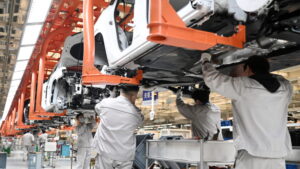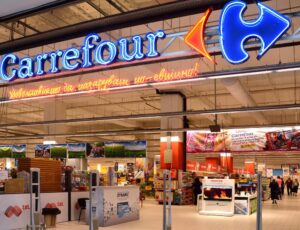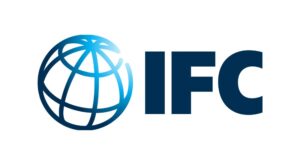
According to Serbian Economist, the Chinese company Techron Automotive plans to build its first foreign plant for the production of plastic car components in the city of Inđija (Vojvodina, Serbia), which will strengthen the country’s role as a regional hub for the automotive industry. This was announced by the Municipality of Inđija, as cited by Serbia-business.eu.
The construction is planned to start by the end of this year. According to the published information, the plant in Indjija will be the first Techron plant outside China. At the first stage, the construction of a 4.5 thousand square meters production building is envisaged. After reaching full capacity, the enterprise will be able to provide about 200 jobs.
The plant is scheduled to open in mid-2026.
Techron produces components for the world’s leading automakers – Volkswagen, Porsche, Audi, Chery, Geely and others. The product line includes engine and transmission parts, interior and exterior components, as well as control system components.
Experts note that the project fits into Serbia’s strategy of deepening specialization in the automotive industry and automotive components: dozens of plants for the production of harnesses, electronics and plastic parts for European and Asian brands are already operating in the country. For the region, this means not only new jobs, but also the need to invest in energy, logistics and vocational education in order to consolidate the effect of the new investor.
https://t.me/relocationrs/1782

According to Serbian Economist, the Serbian Ministry of Internal and Foreign Trade reported that on November 3, Minister Jagoda Lazarevic met with representatives of Carrefour, who confirmed their interest in entering the Serbian market. According to the ministry, the retail chain is considering direct entry without intermediaries, intends to make Serbia a regional hub and attract local suppliers; negotiations will continue and Carrefour’s top management will come to Serbia by the end of this year.
Serbian business publications, referring to the minister’s statement, specify that the working model is being discussed in several formats, including the search for local franchise partners, while the basic scenario is the direct presence of the chain. The ministry positions the possible arrival of a new player as a way to strengthen competition and offer a wider range of products at competitive prices.
Tanjug Agency notes that Carrefour’s interest in Serbia fits into the Balkan expansion of the chain; previously, specialized resources reported about the exclusive rights of the Greek structure to develop the brand in the region, but the current statements of Belgrade emphasize the direct entry into the market.
The company has not officially announced specific launch dates and locations.
Earlier, Serbian Economist reported about the chain’s negotiations about entering Serbia, but without final decisions. The final terms and format of the presence will depend on the results of the management visit, availability of suitable retail space and agreement of terms with the regulator and potential local partners.
https://t.me/relocationrs/1691
After a nighttime incident in Podgorica, where a group of Turkish citizens stabbed a local resident during a conflict, the government of Milojko Spajić announced a temporary suspension of the visa-free regime for Turkish citizens—a political signal that security and entry controls take priority over previous openness (visa-free travel had been in place since 2008). The decision was confirmed by leading international media and government sources, which record both the incident itself and the authorities’ response formula—“a temporary pause + a rules review,” with the prospect of further consultations with Ankara on a new visa regime.
According to police reports, after a weekend marked by tension in the capital, several dozen foreigners—primarily citizens of Türkiye and Azerbaijan—were detained; President Jakov Milatović publicly called for calm and condemned retaliatory attacks on Turkish citizens and their property. This set of actions—stepped-up patrols, selective checks of legal stay, and preventive detentions—aligns with the logic of a “rapid stabilization” of order following stabbing incidents.
The socio-political backdrop has sharpened: anti-Turkish slogans were heard on the streets of Podgorica, and acts of vandalism were recorded—in particular, a business owned by a Turkish citizen in the city center was trashed, and a Turkish owner’s car was set on fire. These episodes heighten the risk of “collective responsibility,” when a single criminal offense triggers a chain of xenophobic reactions that harm people’s safety and the business climate.
The interstate dimension is developing in parallel: Türkiye’s foreign ministry promptly reached out to the Montenegrin prime minister and security officials, insisting on guarantees of rights and protection for Turkish citizens; Podgorica, for its part, declares “intensive consultations” with Ankara to find a model that combines public safety with continued economic interaction. This means that the “pause” in visa-free travel is not only a punitive gesture but also an instrument for reformatting access rules: new forms of short-term visas, mandatory registration procedures, or higher criteria for business visitors are possible.
The economic projection of the situation is ambiguous. Turkish business in Montenegro is a notable player in trade, hospitality, and real estate, especially along the Adriatic coast; rolling back visa-free travel will almost certainly reduce the mobility of entrepreneurs and workers, complicate seasonal planning, and slow transactional processes. Estimates of the size of the Turkish community vary: a number of sources cite roughly 13.3 thousand officially resident Turkish citizens (which is higher than the 2–3 thousand estimates mentioned in some materials), and for this group a clear, predictable procedure for extending stays and conducting business is crucial to avoid an outflow of investment and a “cooling” of employment in tourism and services.
At the domestic political level, the authorities’ decision serves several functions at once: it demonstrates control and sensitivity to the demand for security; cuts off the argument about “open gates” for offenders; and simultaneously mitigates reputational risks vis-à-vis the EU, with which Montenegro is negotiating membership, by aligning migration regimes and public-order standards with European practice. However, excessive “toughness” without simultaneously restraining xenophobia may provoke an escalation of ethnic tension and inflict long-term damage on the country’s investment image—this is precisely why the president’s message about the inadmissibility of attacks on Turks is a systemically important marker of balance.
From this follow the near-term scenarios. The first is “controlled thawing”: after stabilization and de-escalation of violence, and after technical parameters are agreed with Ankara, Podgorica restores simplified entry in an updated format (for example, through mandatory declarations of travel purpose or expedited category-based visas for investors and workers). The second is a “long pause”: the visa regime becomes entrenched, criteria for verifying the very purpose of entry and the legality of stay grow stricter, and Turkish companies’ business processes become costlier and slower, with a risk of investment being reallocated to neighboring jurisdictions. The third is “social turbulence”: if law-enforcement response to anti-Turkish pogroms is unsystematic, public sentiment will radicalize, and even a properly calibrated visa filter will not compensate for the loss of investor and tourist confidence. At present, government communications—about consultations with Türkiye and safeguarding public order—indicate that the bet is on the first, compromise path.
In summary, Montenegro’s decision to suspend visa-free travel is a system-level “alarm signal”: the authorities are simultaneously extinguishing a situational security crisis and trying to revise the architecture of migration procedures according to standards of control and predictability. However, the sustainability of this course will be determined not only by the strictness of border filters, but also by the state’s ability to protect lawful residents and entrepreneurs from collective punishment, hold perpetrators accountable, and preserve channels of economic cooperation with Türkiye—a partner that is already demanding security guarantees for its citizens and is ready to negotiate new rules of the game.
CRIME, INVESTMENTS, MONTENEGRO, PODGORICA, PUBLIC SENTIMENT, TURKEY

The International Finance Corporation (IFC) will invest in the capital of Ukrainian insurance companies, which is a powerful signal for Ukrainian insurers and international companies.
This was discussed at a meeting between the leadership of the National Bank of Ukraine and World Bank President Ajay Banga and Managing Director of Operations Anna Bjerde, according to the NBU’s Facebook page.
It was emphasized that additional investment opportunities will be created with the help of MIGA (Multilateral Investment Guarantee Agency), which provides guarantees for financing.
In addition, the meeting discussed further financial support for Ukraine, strengthening energy security, and increasing the country’s investment potential through the introduction of new financial instruments.

Volumes of investments in primary housing in the next 2-3 years will grow up to 15% annually, such a forecast was voiced by CMO Alliance Novobud Irina Mikhaleva in comments to the agency “Interfax-Ukraine”.
“The market has adapted to the realities of wartime, and key investors – in particular Ukrainians, and for business class – often foreigners, are increasingly choosing new buildings as a tool for preservation and multiplication of capital. In the next 2-3 years we expect that the volume of investment in primary housing will grow by 10-15% annually, the demand for income property and business class real estate will increase, and the main role will be played by trust in the brand of the developer and security of location”, – said Mikhaleva.
She noted the competition from the secondary market, but does not consider it determinant. After all, the primary market competes not only with more comfortable layouts and well thought-out infrastructure, but also with systematically better quality solutions, first of all, safe and inclusive.
“Modern layouts with wider doorways, spacious bathrooms, principles of inclusiveness, new and reliable engineering communication systems, safe and reliable monolithic-frame construction technology, energy efficiency, alternative ways of energy supply,” Mikhailova lists the advantages of primary housing.
According to experts of Alliance Novobud, soon there will be a shortage of ready housing in the segment of the capital’s business and comfort classes. The reasons are different: in the business class part of the projects have not yet been restored or are realized with significant delays, in comfort – the potential demand is higher than the volume of launch of new projects.
“To ensure maximum investor protection, we are implementing several key approaches in Alliance Novobud, in particular, transparency of the legal model, financial stability of the company, construction phasing and internal control. At the same time, we continue to adapt to the needs of the market, offering investors installments more affordable than bank mortgages,” she says.
According to the data of the portal of new buildings LUN, Alliance Novobud was founded in 2006, since 2010 the company has commissioned 37 houses and parking lots. During the full-scale invasion commissioned 12 houses for more than 1.3 thousand apartments in Brovary and in Kiev. In the process of realization 9 houses of Krona Park II residential complex in Brovary and a premium class project in the capital Montreal House.